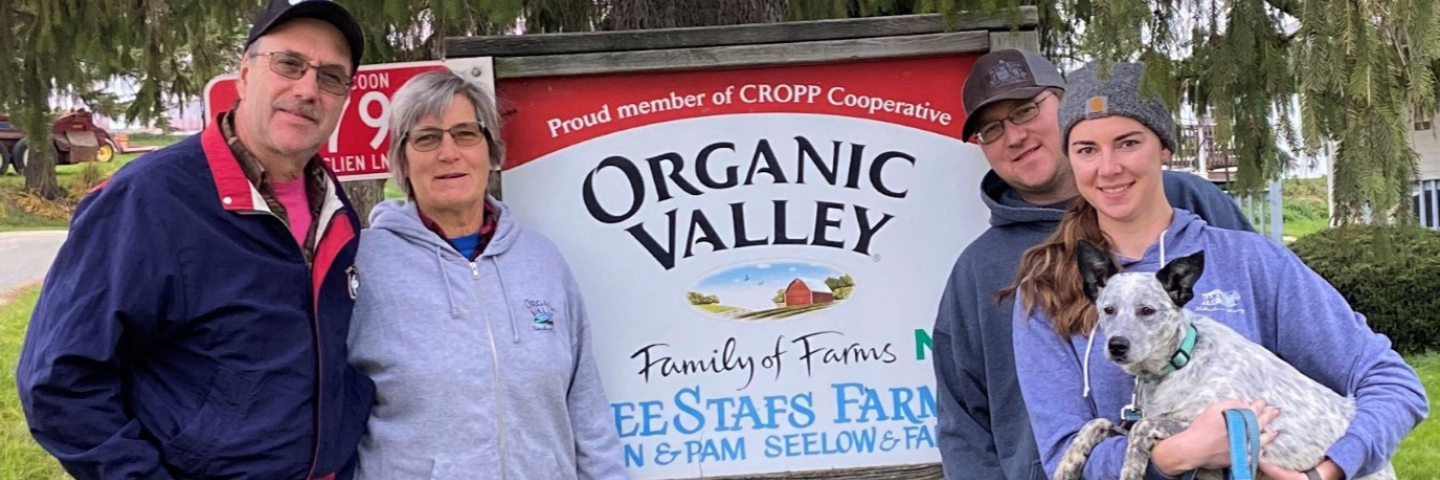Life-long Learning Leads to Organic Outcomes

The love of learning and their family land led Vernon County’s Pamela and Alan Seelow to organic certification and setting up their family farm successors for continued success.
Background
Pamela (née Stafslien) and Alan Seelow grew up on farms ten miles apart in the hills and valleys of the Driftless area near Chaseburg, Wisconsin. They married in 1983, and ten years later moved to Pamela’s family farm, which was homesteaded in 1886 by her great-grandparents. Their love of the area and fond memories of growing up in large families on the land led them to purchase both properties as the next generation to continue the family farming legacy. They chose to combine their family surnames in the merge; and since, SeeStafs Farm has bloomed into 400 acres with an additional 200 acres of rented cropland and pasture for their organic dairy farm and forestry operations.
Before the purchase, Alan received his degree in heating and air-conditioning and had been traveling worldwide promoting and servicing dairy equipment and bulk tanks for over a decade. Pamela worked part-time and focused on raising their four children. But new farm ownership ignited agricultural interests in the whole family, including each of their children, encouraging substantial involvement and leadership roles in local County 4-H and Future Farmers of America programs. Pamela and Alan’s value of life-long learning lead them to pursue the Wisconsin Technical College’s Farm Business & Production Management training, where they first learned about the U.S. Department of Agriculture’s Natural Resource Conservation Service (NRCS) programs.
Highlights
The Seelows began partnering with NRCS through the Environmental Quality Incentives Program (EQIP) to implement a Nutrient Management Plan and have continued with EQIP funding to address erosion in their cattle lanes by installing access roads. They practice rotational grazing in their 16 paddocks with fences, water lines and water tanks. Cover crops provide additional conservation and improve soil health in their planted acres. EQIP and the Conservation Stewardship Program (CSP) have addressed erosion concerns, increased crop production, animal health improvement and access to forest harvest.
On the half of their acreage that is forested, EQIP helped them add trails and landings and improve forest stands, which lead them to enroll in the Wisconsin Department of Natural Resources’ Managed Forest Law (MFL) program. The income from forest-harvested products helps to provide supplemental support their dairy operation.
In 2004, after an evaluation and comparison of their current/preferred farming practices to organic standards and the stable pricing organic dairy production offered, SeeStafs Farm became a Certified Organic operation.
“SeeStafs Farm is always willing to install conservation practices, whether it is on the cropland, pasture or in the woodlands,” said Tom Kreuzer, NRCS Conservation Technician at the Viroqua Service Center. SeeStafs Farm became the 600th farm to join the Organic Valley family farmer-owned cooperative, of which there are currently 1800 farms.
Future Plans
The conservation practice enhancements implemented have allowed SeeStafs Farm to concentrate on adding wildlife habitat. Pamela and Alan have enrolled for assistance through CSP to add a field border and bird houses. As they look toward retirement, their son and his wife, Anthony and Megan Seelow are prepared to take over the 64-milk cow dairy operation as the 5th generation to farm that land. Pamela and Alan are confident that the conservation efforts they have spent their farming career completing will be in good hands.
Additional Information
Conservation Stewardship Program - Wisconsin
The Conservation Stewardship Program (CSP) can help you identify natural resource problems in your operation and provide technical and financial assistance to solve those problems or attain higher stewardship levels in an environmentally beneficial and cost-effective manner.
Learn MoreEnvironmental Quality Incentives Program - Wisconsin
The Environmental Quality Incentives Program (EQIP) provides financial and technical assistance to agricultural producers and non-industrial forest managers to address natural resource concerns.
Learn More
